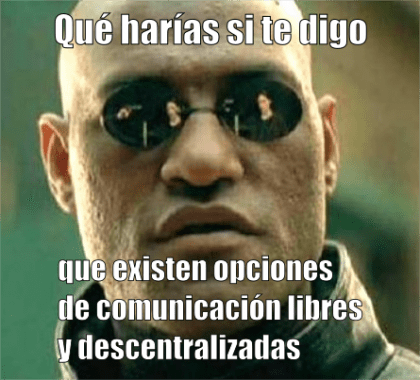The war for control of communications
Around 2005, the war for the domain of direct message communication began. Since before the birth of WhatsApp, half the world preferred to write text messages instead of calling because the messages have that I don't know what makes the conversation more interesting.
For the average user, the release came from the hand of two former Yahoo employees who thought of a multiplatform application that would use the power of the internet to send and receive messages and images: WhatsApp. But of course, for the most dedicated users, these types of applications existed since the early 1990s (IRC and XMPP), although not on cell phones.
I am not going to retell the story of WhatsApp and the tree of similar applications, but suffice to say that todas The popular apps (Telegram, Allo, Wee Chat, Line, Hip Chat, Imo, Viber, Facebook Messenger, and a long etc.) are an effort to build and control a monopoly around communications. Even if the proposal is free and open, most of the proposals use their own protocol, which makes it only possible to communicate if you have them regardless of whether the protocol is free or not. Why is that dangerous or at least objectionable? Imagine that you cannot call your friend because she does not have the same telephone company as you, or that you cannot write an email to your partner because they have an account with a different service than yours. Sounds stupid, right? Well, the same applies to messages, only that we see isolation between messengers as natural because companies have made an effort to isolate (with all the irony that that implies) different protocols to remain as owners of the monopoly (and charge for it in passing) .
Free and decentralized communication

The XMPP protocol is decades old and proposes exactly the opposite: universal and decentralized communications for everyone. I will not talk about this protocol again and how it is an opportunity missed by the vast majority of users. What I am going to say is that his big problem was (and still is) his lack of plasticity and adaptation to new trends and uses of contemporary communications. To try to remedy this there is a new protocol: matrix. Matrix is an open standard for interoperable and decentralized communications. It is friendly with recent technologies and, above all, it is very flexible to communicate with other old and new protocols (currently it is 100% compatible with XMPP and IRC, but also with Slack, Skype and Lync). The idea is the same: a standard that can be implemented by anyone and that allows communication even if your server or service is different from mine. There are already many clients (also open and free) that allow you to connect to matrix (the most popular is Riot, developed by the same matrix team), and there are already multiple servers interoperable that offer the possibility of registering to start communication (although, again, the most popular Synapse, from the creators of matrix).
Most people are not interested in something being free, much less decentralized, and yet matrix has an opportunity for simplicity of use and interconnectivity (such as its bridges with Skype, Slack or Lync), so in the environment work has a lot of potential. Another great advantage is the ability to encrypt the communication, although this would limit the flexibility of the history and could be counterproductive in an environment where you need to know who said what a week or more ago.
The market for "free" messaging seems to be something unimportant, but an example that there is a lot of money involved is that of Google, which every year changes its strategy and kills and creates messaging applications with the sole objective of becoming the banner in communications, although in its history it has not been even close. Whether we are aware or not, we live in a world with massive espionage and discrimination with commercial and criminal intentions (or "security", as some call it), so losing the sovereignty of our communications cannot be an option. Matrix seems to be a standard that is growing and that little by little is making room in a world of communications saturated with commercial options.
What a good article,
«Imagine that you cannot call your friend because she does not have the same telephone company as you, or that you cannot write an email to your partner because she has an account in a service other than yours. Sounds stupid, right? Well, the same applies to the messages »That's gold
I strongly disagree from a privacy and security point of view. Traceability, the guarantee of information privacy and the meta-information generated by p2p communications are being trivialized.
In my opinion, this article has been left halfway and the reasons given are incorrect or, at least, questionable.
Very interesting.
we're going to try it